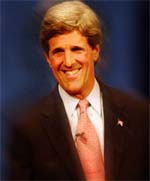 Sen. John Kerry: Where does he stand on gay issues? Sen. John Kerry: Where does he stand on gay issues? |
In the beginning there were eight candidates seeking the Democratic
nomination for president and three of them were more pro-gay than John
Kerry, who is opposed to same-sex marriage.
Now it is a given that Kerry will win the Democratic nomination in
July in Boston. Where does he stand on gay issues?
The federal Employment Non-Discrimination Act:
"In 1985 ... I became the original sponsor and author of the gay civil-rights legislation in
the United States Senate -- before Ellen DeGeneres, before Will & Grace,
before anyone knew who Melissa Etheridge was, before there'd been a
march on Washington, when it was radioactive. ... I have cosponsored
ENDA and voted for it when it came before the Senate in 1996. I have
also adopted a nondiscrimination policy for my congressional offices so
that sexual orientation is not a factor in employment decisions." |
Inclusion of transgender people in ENDA:
"I oppose discrimination of all kinds and my office policy prohibits discrimination in the workplace
based on gender identity and expression. I believe that we should focus
efforts on getting ENDA passed and signed into law, and I am concerned
that adding gender identity and expression to the ENDA legislation is
likely to significantly hinder that effort."
Inclusion of "sexual orientation" and "gender identity" in federal
hate-crime laws:
"It is shameful that Americans still suffer as victims
of hate crimes based on sexual orientation and gender and remain without
protection at the federal level. I support S. 966, and voted for a
similar amendment in 2000, which extends the definition of hate crimes
to add actual or perceived sexual orientation and actual or perceived
gender as protected categories."
Same-sex marriage (1):
"While I do not support gay marriage, I support
civil unions and I believe that gays and lesbians should have full
rights and equality under the law. ... Same-sex couples should be
afforded the same rights and benefits as married couples ... including
access to pensions, health insurance, family medical leave, bereavement
leave, hospital visitation and survivor benefits. ... Additionally, I am
one of six cosponsors of legislation to provide domestic-partnership
benefits to gay and lesbian federal employees."
Same-sex marriage (2):
"It may well be that if we achieve civil unions
... then we may -- all of us -- progress ... to a place where there is a
different understanding [on marriage]. But I think that one has to
respect the current cultural-historical-religious perception [against
same-sex marriage], and I respect it."
Same-sex marriage (3):
"Whether you call it marriage or not is up for
grabs, but you have to have the rights. ... I think marriage is a term
that kind of gets in the way of this discussion. But there is a
distinction between church-sanctioned marriage and what rights the
states give. A state itself can afford different rights. The rights is
what's critical. It's equal protection under the law that is at stake
here."
Same-sex marriage (4):
"Marriage to many people is obviously what is
sanctified by a church. It's sacramental. Or by a synagogue or by a
mosque or by whatever religious connotation it has. Clearly there's a
separation of church and state here. ... Marriage is a separate
institution. I think marriage is under the church, between a man and a
woman, and I think there's a separate meaning to it."
Same-sex marriage (5):
"An equal-protection clause, I think, pertains
to the rights you give to people, not to the name you give to something,
so I'm for civil unions. That gives people the rights: the rights of
partnership, the rights of inheritance of property, the rights of
taxation and so forth. But I think there is a distinction between what
we have traditionally called 'marriage' between a man and a woman and
those rights. ... I believe very strongly that we can advance the cause
of equality by moving toward civil unions. But that's where my position
is at this point in time. What is distinct is the institutional name.
Whatever people look at as the sacrament within a church or within a
synagogue or within a mosque as a religious institution, there is a
distinction. The civil state really just adopted that. It's the rights
that are important, not the name of the institution."
The Massachusetts Supreme Judicial Court ruling legalizing same-sex
marriage:
"While I continue to oppose gay marriage, I believe that
today's decision calls on the Massachusetts state legislature to take
action to ensure equal protection for gay couples. ... I believe the
right answer is civil unions. I oppose gay marriage and disagree with
the Massachusetts Court's decision."
Social Security benefits for same-sex partners:
"Support."
Immigration rights for same-sex couples:
"Support."
The military's "Don't Ask, Don't Tell" policy:
"In 1993, I was one of four senators who testified before the Armed Services committee that it
was fundamentally wrong to continue to deny gay and lesbian Americans
the right to participate in the armed forces of the United States."
Is being gay a choice?:
"I think it's entirely who you are from birth,
personally. Some people might choose, but I think that it's who you are.
I think people need to be able to be who they are. I have a friend who
was married for many years and then the marriage dissolved and he came
out and he announced that he was gay, and he lived this life of tension,
and of great difficulty. And I don't think that's a kind of choice. I
think that's being who you are. It's in your system. It's in your genes.
... I think that people have a right in America to be who they are, who
they are born as, and we are all God's children, and that is my view."
|
|
|

